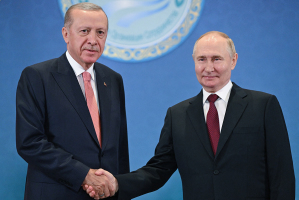5 reasons why strong pastoral leadership is biblically essential

In 2023, the book Circles Not Rows proposed a shift in church structure, advocating for small group models where everyone has an equal voice, replacing the traditional model of a pastor providing strong leadership and instruction to a congregation. While small groups and two-way communication have their merits, this "Circles Not Rows" approach raises significant concerns, especially when applied as a wholesale replacement for authoritative leadership in churches.
As a leadership teacher and observer of cultural trends, I believe this approach risks undermining the God-ordained structure for leadership in the Church. While abusive or dictatorial leadership must always be opposed, the weakening of pastoral authority has left many churches in disarray. Below are five reasons why strong pastoral leadership is not only biblical but essential for thriving churches and organizations.
1. Scriptural precedence for pastoral authority
Throughout Scripture, God consistently establishes clear chains of command. From the first days of the Garden of Eden, God has delegated authority and responsibility in orderly structures. This principle is evident in the leadership of Moses over Israel, where authority was delegated from Moses to tribal leaders and their deputies.
In the New Testament, this chain of authority continues in the local church. For instance, “Obey them that have the rule over you, and submit yourselves: for they watch for your souls, as they that must give account” (Hebrews 13.17). Similarly, pastors are described as “overseers” (Acts 20.28), and Peter exhorts elders to “feed the flock of God which is among you, taking the oversight thereof” (1 Peter 5.2).
While pastoral authority does not grant unchecked power or extend into personal matters of parishioners, it is clear that within the local church, pastors are given significant God-ordained authority. Churches that diminish this authority risk replacing Biblical order with a chaotic or misguided democracy rooted in secular psychology.
2. Pastors are shepherds
The term pastor itself means “shepherd.” Shepherds are responsible for feeding and protecting the flock — a role God has consistently entrusted to spiritual leaders throughout history. In the Old Testament, God says, “And I will give you pastors according to mine heart, which shall feed you with knowledge and understanding” (Jeremiah 3.15). This theme is carried into the New Testament as Peter commands, “Feed the flock of God which is among you” (1 Peter 5.2), and Paul reminds pastors they are made “overseers” by the Holy Spirit (Acts 20.28).
Participative leadership models risk outsourcing the shepherd’s responsibilities, leading to potential harm. Group discussions and small groups have their place, but when unqualified individuals are given a platform to teach or influence, as they often are in circles, the congregation may be exposed to false teachings or dangerous ideas. Worse, without strong pastoral oversight, churches may fail to identify and deal with spiritual “wolves” — individuals who seek to harm or divide the flock.
Shepherds are uniquely equipped to discern and confront these threats. Jesus said, "The good shepherd giveth his life for the sheep" (John 10.11). In contrast, hired hands or those lacking spiritual authority leave the flock vulnerable.
3. Rows maintain order
“In those days there was no king in Israel: every man did that which was right in his own eyes” (Judges 21.25). This verse paints a grim picture of what happens when authority is absent: chaos reigns. Without clear leadership, power vacuums form and are often filled by those with selfish motives or hidden agendas.
A strong pastor prevents such disorder. Though it is not the pastor’s job to be a dictator in the church, it is their job to ensure that no one else becomes a dictator in the church. Churches plagued by drama and division often share one trait: weak pastoral leadership. By contrast, strong pastors establish peace through decisive and consistent leadership, allowing congregations to worship and serve without constant conflict. Peace through strength.
4. Decisive action
In ministry, decisiveness often prevents unnecessary confusion and conflict. Early in my pastoral experience, I would ask congregations for input on event planning. The result was often chaos — 15 different ideas about dates, times, and meals, with no clear consensus. These discussions led to hurt feelings and unnecessary drama.
Now, decisions are announced rather than debated, and the response has been overwhelmingly positive. Congregants appreciate clarity and direction. This principle mirrors the structure of a military unit, where decisive leadership ensures swift and effective action. Churches that rely on endless committee meetings or straw polls for decision-making risk stagnation and frustration.
Strong pastoral leadership is the antidote, ensuring that decisions are made efficiently and in alignment with the church’s mission.
5. Most congregants lack spiritual maturity to lead
While this may sound harsh, it reflects the reality of modern Christianity. Many churchgoers today are spiritually immature and biblically illiterate. The Apostle Paul lamented this problem in his day: “For when for the time ye ought to be teachers, ye have need that one teach you again which be the first principles of the oracles of God” (Hebrews 5.12).
By replacing rows with circles, we have inadvertently given equal voice to individuals who lack a firm understanding of Scripture. This creates opportunities for confusion, error, and division. Instead, pastors are called to boldly proclaim the truth: “Preach the word; be instant in season, out of season; reprove, rebuke, exhort with all longsuffering and doctrine” (2 Timothy 4.2).
Strong pastoral leadership ensures that the church remains grounded in Biblical truth and protected from the pitfalls of popular opinion or misguided feelings.
Conclusion
This is not a defense of spiritual abuse or unchecked authority. Pastoral leadership must always align with Scripture and remain accountable to God. However, churches must recognize the dangers of adopting overly participative, or democratic models of leadership, or worse, sitting by idly while someone who isn't the pastor assumes the role of dictator of the church. The biblical model is clear: God entrusts pastors with authority to shepherd, feed, protect, and lead His people.
Returning to this model will bring greater order, decisive action, and spiritual health to our churches. It is time to embrace rows, not circles, and celebrate the blessings of strong, God-ordained leadership.
Jeremy Farley is a former local government official with a heart for his community. He is a church planter in Wytheville, Virginia. What began as a humble gathering has since flourished into the area's fastest-growing ministry, bringing together people from all walks of life. Proudly Appalachian, Jeremy and his wife raise their family in the Blue Ridge Mountains embracing the rugged beauty of Southwest Virginia.




























